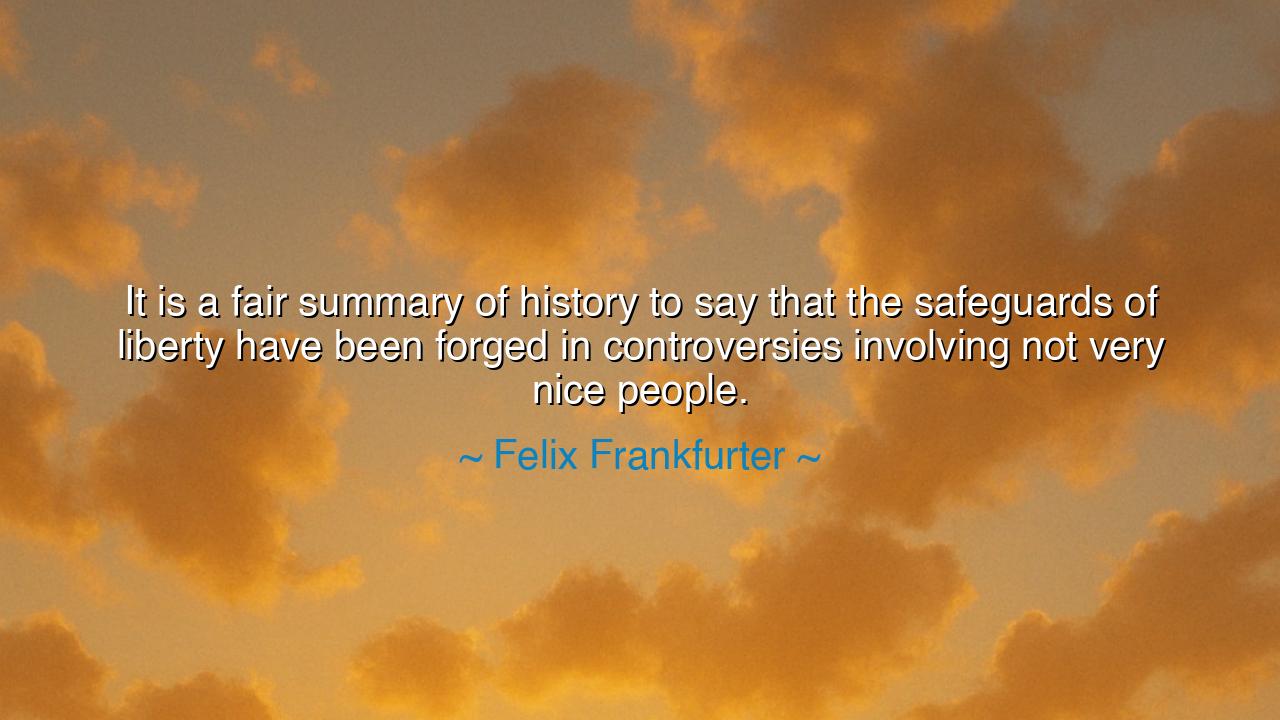
It is a fair summary of history to say that the safeguards of
It is a fair summary of history to say that the safeguards of liberty have been forged in controversies involving not very nice people.






“It is a fair summary of history to say that the safeguards of liberty have been forged in controversies involving not very nice people.” Thus spoke Felix Frankfurter, the wise jurist of the United States Supreme Court, whose words reach into the deep heart of justice itself. In this statement lies a paradox that has echoed through the ages: that the defense of liberty, the very foundation of civilization, has often been shaped not by the noble or the beloved, but by the flawed, the outcast, and the despised. For in the testing of society’s compassion and fairness toward those who are least admired, the true measure of freedom is revealed.
Frankfurter, who served on the Supreme Court during the turbulent mid-twentieth century, was no stranger to such trials of conscience. He had seen that the law — that fragile guardian of liberty — must often stand firm in defense of men whose deeds or words provoke anger or fear. For it is easy to defend the rights of the popular, but the true test of justice comes when it must protect the unpopular. To him, this was the lesson of history: that the safeguards of liberty were not forged in comfort or agreement, but in the fires of controversy, when passion and prejudice threatened to overwhelm reason.
Consider the ancient world, where the voice of one man changed forever the meaning of truth and speech: Socrates, accused of corrupting the youth of Athens and disrespecting the gods. He was not, in his time, seen as a hero but as a dangerous nuisance. Yet his trial — his questioning of authority and his demand for freedom of thought — became one of the first great crucibles of liberty. Though condemned to death, his defense laid the moral foundation upon which all future debates of freedom would stand. Thus, from the persecution of one “not very nice” man in the eyes of his peers came the immortal ideal of the freedom of inquiry — a safeguard of civilization.
Or recall the story of John Peter Zenger, a printer in colonial America, who was tried in 1735 for daring to criticize the British governor of New York. Zenger was no grand statesman or philosopher, but a simple publisher whose words were seen as insolent and dangerous. Yet when a jury acquitted him, declaring that truth was a defense against libel, a new star was lit in the firmament of liberty — the principle of a free press. His trial, born from controversy and disdain, became the cornerstone of one of democracy’s most sacred rights. So it has ever been: that the law is tested not in harmony, but in discord, and that liberty finds its strength not in the applause of the crowd, but in the resistance to its wrath.
Frankfurter’s words also echo through the trials of more modern times. In the 20th century, the Supreme Court defended the rights of radicals, dissenters, and outcasts — Communists, protesters, and agitators — those whom society called dangerous or unpatriotic. Yet it was precisely in defending their right to speak, to publish, and to assemble that the Constitution’s promises were preserved. For if liberty applies only to those we like or agree with, then it is no liberty at all — merely privilege disguised as principle. The law, Frankfurter understood, must protect even those who defy it, lest tomorrow it fail to protect the innocent.
This truth is uncomfortable, for it demands that we look beyond emotion and judge by principle, not by preference. To defend the rights of the reviled is an act of moral courage, a recognition that justice must be blind — not blind in ignorance, but blind in equality. It is easy to demand freedom when it serves us, yet the strength of a free people lies in their willingness to extend that freedom to others, even when it wounds their pride or offends their sensibilities. Every generation must learn this anew, for fear and anger are quick to return, whispering that some among us are too dangerous for liberty. But as history has shown, the moment we deny rights to one, we endanger them for all.
So, my child of tomorrow, take heed of Felix Frankfurter’s wisdom. Do not measure the worth of liberty by the character of those who claim it, but by the fairness of the principles that guard it. When you see controversy, look for the lesson within it; when you see injustice, remember that today’s outcast may become tomorrow’s teacher. Defend not only the pleasant and the virtuous, but the right itself, for the right belongs to all. Let your heart be strong enough to separate the deed from the dignity, the act from the ideal.
For liberty, like iron, is forged in fire — in the heat of controversy and the clamor of unwelcome voices. It is there, and only there, that its true strength is proven. So do not fear the storm, for it is in such tempests that the eternal safeguards of freedom are born. Stand, then, for justice — not when it is easy, but when it is hard. For in that steadfastness, you join the company of those who, across the ages, have kept the torch of liberty burning against the winds of time.






AAdministratorAdministrator
Welcome, honored guests. Please leave a comment, we will respond soon